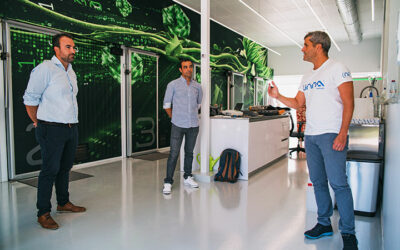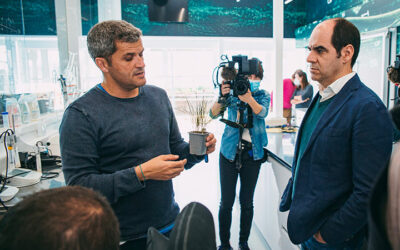The pharmaceutical company PharmaMar Group and Kimitec’s research center will work together to improve agricultural performance.
RNA (Ribonucleic Acid) interference, discovered in 2006 and awarded with a Nobel Prize in Physiology or Medicine, is currently considered one of the greatest advances in the field of Biology in the last century. This is mainly due to its possible applications in drug development, as well as in the manufacture of solutions for agricultural use.
In fact, it is in the field of agriculture on which the collaboration between the MAAVi Innovation Center and Sylentis will be based. To achieve full implementation of the RNA interference in the agri-food industry, Kimitec’s R&D&I center and the biopharmaceutical company PharmaMar Group, both leaders in their own areas of activity, will develop new strategies based on the application of siRNA treatments (short interference RNA). These treatments will include natural molecules that use the RNA interference mechanism because of the sustainability, favoring a targeted gene expression reduction to allow pest and pathogen control in plants. In addition to these treatments, both Kimitec and Sylentis will be involved in production strategies based on fermentation processes, rather than on other synthetical methods.
Kimitec has extensive knowledge in the field of Natural Intelligence, that is, natural molecules and compounds, which it has acquired after over 15 years of research in the field, which is combined with Sylentis’ expertise, a pioneer in the application of RNA interference technology to drug use since 2006, and owner of the first and only siRNA production plant in Spain.
The CEO and founder of Kimitec and its MAAVi Innovation Center, Félix García Moreno, stresses the importance of sustainable mechanisms to keep moving forward in the agri-food industry: “Thanks to our knowledge in Natural Intelligence, which we use for the transformation of agriculture, we can implement mechanisms to produce these molecules through fermentation processes, which are greener and more sustainable, and as effective and cost-effective as those based on synthetic chemistry, or even more.
Through this agreement, both companies will jointly conduct research on new products against viruses affecting agriculture, including pests, diseases and pathogens of various types, helped by the potential of Big Data and Artificial Intelligence (AI).
So far, most solutions against pests and diseases are of a generalist nature, they focus on suppressing the effects of the pathogenic proteins, but these new treatments based on RNA interference would be very specific, and will be rather targeted to the molecular triggers of the disease. To give a simple example, if the problem was a ship sinking because of a hole in the hull, the solution used so far would be scooping out the incoming water; however, this new RNA interference treatment would imply sealing the hole, directly preventing the ship from sinking.
This analogy also applies to agricultural production, and it can help in many ways, from stopping a white fly plague without affecting beneficial insects to enhancing fruit color naturally.
A great emphasis is placed on the need to use natural raw materials and achieve zero residue in agricultural research, as explained by Félix García:
“We ensure a zero level of toxicity to humans, the fauna or the flora. We are extremely selective, and we firmly stick to zero residue practices, which will allow us to maximize the efficacy of bioprotection products, as well as the grower’s profitability.
“For Sylentis, this agreement is an opportunity to make our RNAi technology available to a company as innovative as Kimitec. Our software, SIRFINDER®, creates siRNAs using Artificial Intelligence (IA) algorithms, quickly, specifically and safely for all species with a conserved RNAi mechanism. Holistic design practices incorporated by SIRFINDER® for the selection of siRNAs based on bioinformatics represent an important breakthrough in the elimination of adverse impacts on both the environment and human health. These siRNAs will improve the production and quality of agricultural products with a minimum impact on the environment, thus also benefiting the consumers”, says Ana Isabel Jiménez Antón, Director of Operations of Sylentis, when she explains the contribution of Sylentis’ Artificial Intelligence technology to the agreement.
As mentioned before, the use of AI and Big Data for the design and production of siRNAs, which will allow to apply the RNA interference system in the agricultural sector, will be a key part of this agreement. All thanks to the advances made by Sylentis in the field of AI with its SIRFINDER® application, a system that boosts and accelerates the development of drugs based on a method as innovative as RNA interference. And after its recent update, which allows to adapt the designs to plants and other organisms, it has become an extremely valuable strategic ally for agricultural research.
Félix García Moreno adds:
“With this RNAi and the technology of Sylentis, Kimitec will count on a highly versatile tool, which will reinforce our capabilities in the field of Natural Intelligence, opening up new ways to improve scientific research on disruptive solutions for plant health.”
Félix García Moreno repeatedly highlights the role of Natural Intelligence in Kimitec’s business profile, and not by coincidence. Within the scope of the agreement between the MAAVi Innovation Center and Sylentis, the use of Kimitec’s AI platform, LINNA®, will allow to create a disruptive R&D&I model for the agricultural sector, capable of expanding research on natural microorganisms, molecules and compounds with the aim of replacing those based on synthetic chemistry. That is the core goal upon which this alliance is based, and the main principle of the Andalusian company.



